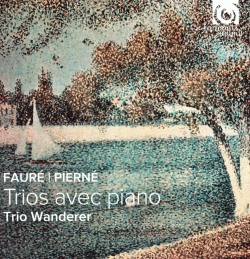
|
Gabriel PIERNÉ (1863-1937)
Piano Trio in C minor, Op. 45 (1922) [39.00]
Gabriel FAURÉ (1845-1924)
Piano Trio in D minor, Op. 120 (1922/23) [18.30]
Trio Wanderer (Jean-Marc Phillips-Varjabédian (violin); Raphaël Pidoux (cello);
Vincent Coq (piano))
rec. February 2014, Teldex Studio, Berlin, Germany
HARMONIA MUNDI HMC902192 [57:35]
In France in 1871 a crucial move away from the Austro-German tradition came in the form of the Société Nationale de Musique founded by by Romain Bussine, Camille Saint-Saëns and Henri Duparc. This influential Parisian concert society encouraged and supported native French composers. Gabriel Pierné and Gabriel Fauré benefited from this association. Each wrote a substantial amount of chamber music. The two piano trios here were works completed and premièred within a year of each other.
Pierné especially enjoyed writing for music theatre but also excelled in chamber music, a field where he best demonstrated his unwavering technical assurance. The music conveys a delicate palette of generally subdued colours and intimate emotions. It scores high on grace, charm and style and is mild-mannered flecked with subtle wit. Pierné was around sixty when he wrote his Piano Trio in D minor, Op. 120 introduced in 1922 at the Société Nationale de Musique. The playing of Trio Wanderer just glows with intensity. Marked Agité, de mouvement et de sentiment the opening movement is extremely lengthy at almost eighteen minutes and boasts turbulent writing which repeatedly tightens and lessens in tension. The Allegretto scherzando is upbeat and often playful although one senses a more serious undertone. Considerable in length at almost thirteen minutes the Finale: Modérément lent uses a grave repetitive four-note theme together with a deftly fashioned set of fascinating and contrasting variations.
Far better known is Fauré who was an early member of the Société Nationale de Musique. He became a major influence over many twentieth-century composers. Spanning almost fifty years Fauré’s chamber music is of elevated quality and concluded in a final burst of creativity with a String Quartet, Op. 121. Completed in 1923 the Piano Trio in D minor, Op. 120 received its première the same year at the Société Nationale de Musique on Fauré’s seventy-eighth birthday. Unruffled in temperament the first movement marked Allegro ma non troppo is elegant with the Trio Wanderer revealing glimpses of withdrawn passion. The sunny and comforting Andantino winds its way without a care in the world. The closing Allegro vivo has a rather anxious and restless character as it darts from one idea to another — attention-seeking yet congenial. Curiously at the beginning of the movement Fauré restates several times Leoncavallo’s well-known melody from the aria Vesti la giubba from I Pagliacci. Perhaps Fauré is having a joke with an aria he had heard once too often, but maybe it’s all a coincidence.
I have several of Trio Wanderer’s excellent recordings and have especially enjoyed piano trios by Schubert and Saint-Saëns both on Harmonia Mundi. On this release my already high expectations are exceeded. Clearly immaculately prepared one is conscious of playing that quests deep, yet sensitively into the core of the music. With secure intonation and attractive tone this technically impeccable trio is caught in unrivalled form. The sound is crystal clear and well balanced. One minor grumble is that the disc, at less than an hour playing time, is rather short measure. Another work — say D’Indy’s attractive Piano Trio No. 2 in G major, Op. 98 — could have been accommodated.
Michael Cookson
 |
 |
|











